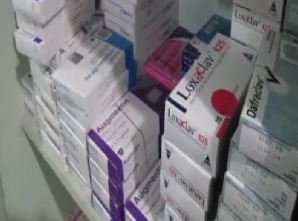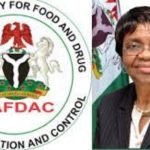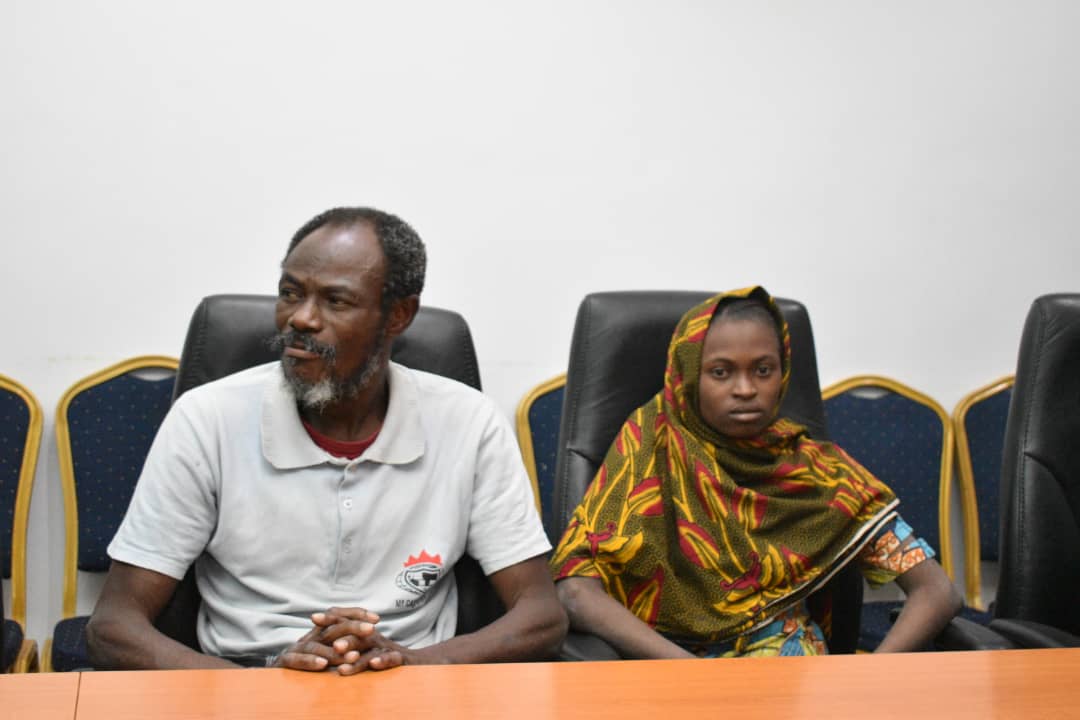 The National Agency for Food, Drug Administration and Control is clamping down on manufacturers and pharmaceutical companies, as it intensifies the war on counterfeit and substandard anti-malaria drugs and antibiotics.
The National Agency for Food, Drug Administration and Control is clamping down on manufacturers and pharmaceutical companies, as it intensifies the war on counterfeit and substandard anti-malaria drugs and antibiotics.
The agency hopes that by the year 2020, it will become mandatory to identify and test the active pharmaceutical ingredient in all imported and locally manufactured drugs.
Kemi Balogun reports that substandard and falsified medicines have become a global problem that presents enormous public health challenges to regulatory authorities in developed and developing countries.
 The National Agency for Food Drug administration and Control, NAFDAC now says it is maximizing efforts at curbing dangers that substandard and falsified medicines pose to public health in Nigeria.
The National Agency for Food Drug administration and Control, NAFDAC now says it is maximizing efforts at curbing dangers that substandard and falsified medicines pose to public health in Nigeria.
There are numerous impacts associated with having substandard and falsified drugs in circulation like increased hospital admissions, development of drug resistance, as well as treatment failures and death.
There has been a considerable spike in substandard anti malaria and antibiotic drugs which is making the drug control agency worried.
The agency reveals it has started enforcing regulation and control of active pharmaceutical ingredients in all drugs, imported or manufactured locally by requesting for submission of the drug master file, which contains the history of processing and safety of the drugs.
One of the strategic plans is to reduce substandard and falsified medicines to not more than 5 percent prevalence in Nigeria by the year 2025.
 The National Agency for Food, Drug Administration and Control is clamping down on manufacturers and pharmaceutical companies, as it intensifies the war on counterfeit and substandard anti-malaria drugs and antibiotics.
The National Agency for Food, Drug Administration and Control is clamping down on manufacturers and pharmaceutical companies, as it intensifies the war on counterfeit and substandard anti-malaria drugs and antibiotics.
The agency hopes that by the year 2020, it will become mandatory to identify and test the active pharmaceutical ingredient in all imported and locally manufactured drugs.
Kemi Balogun reports that substandard and falsified medicines have become a global problem that presents enormous public health challenges to regulatory authorities in developed and developing countries.
 The National Agency for Food Drug administration and Control, NAFDAC now says it is maximizing efforts at curbing dangers that substandard and falsified medicines pose to public health in Nigeria.
The National Agency for Food Drug administration and Control, NAFDAC now says it is maximizing efforts at curbing dangers that substandard and falsified medicines pose to public health in Nigeria.
There are numerous impacts associated with having substandard and falsified drugs in circulation like increased hospital admissions, development of drug resistance, as well as treatment failures and death.
There has been a considerable spike in substandard anti malaria and antibiotic drugs which is making the drug control agency worried.
The agency reveals it has started enforcing regulation and control of active pharmaceutical ingredients in all drugs, imported or manufactured locally by requesting for submission of the drug master file, which contains the history of processing and safety of the drugs.
One of the strategic plans is to reduce substandard and falsified medicines to not more than 5 percent prevalence in Nigeria by the year 2025.
 The National Agency for Food, Drug Administration and Control is clamping down on manufacturers and pharmaceutical companies, as it intensifies the war on counterfeit and substandard anti-malaria drugs and antibiotics.
The National Agency for Food, Drug Administration and Control is clamping down on manufacturers and pharmaceutical companies, as it intensifies the war on counterfeit and substandard anti-malaria drugs and antibiotics.
The agency hopes that by the year 2020, it will become mandatory to identify and test the active pharmaceutical ingredient in all imported and locally manufactured drugs.
Kemi Balogun reports that substandard and falsified medicines have become a global problem that presents enormous public health challenges to regulatory authorities in developed and developing countries.
 The National Agency for Food Drug administration and Control, NAFDAC now says it is maximizing efforts at curbing dangers that substandard and falsified medicines pose to public health in Nigeria.
The National Agency for Food Drug administration and Control, NAFDAC now says it is maximizing efforts at curbing dangers that substandard and falsified medicines pose to public health in Nigeria.
There are numerous impacts associated with having substandard and falsified drugs in circulation like increased hospital admissions, development of drug resistance, as well as treatment failures and death.
There has been a considerable spike in substandard anti malaria and antibiotic drugs which is making the drug control agency worried.
The agency reveals it has started enforcing regulation and control of active pharmaceutical ingredients in all drugs, imported or manufactured locally by requesting for submission of the drug master file, which contains the history of processing and safety of the drugs.
One of the strategic plans is to reduce substandard and falsified medicines to not more than 5 percent prevalence in Nigeria by the year 2025.
 The National Agency for Food, Drug Administration and Control is clamping down on manufacturers and pharmaceutical companies, as it intensifies the war on counterfeit and substandard anti-malaria drugs and antibiotics.
The National Agency for Food, Drug Administration and Control is clamping down on manufacturers and pharmaceutical companies, as it intensifies the war on counterfeit and substandard anti-malaria drugs and antibiotics.
The agency hopes that by the year 2020, it will become mandatory to identify and test the active pharmaceutical ingredient in all imported and locally manufactured drugs.
Kemi Balogun reports that substandard and falsified medicines have become a global problem that presents enormous public health challenges to regulatory authorities in developed and developing countries.
 The National Agency for Food Drug administration and Control, NAFDAC now says it is maximizing efforts at curbing dangers that substandard and falsified medicines pose to public health in Nigeria.
The National Agency for Food Drug administration and Control, NAFDAC now says it is maximizing efforts at curbing dangers that substandard and falsified medicines pose to public health in Nigeria.
There are numerous impacts associated with having substandard and falsified drugs in circulation like increased hospital admissions, development of drug resistance, as well as treatment failures and death.
There has been a considerable spike in substandard anti malaria and antibiotic drugs which is making the drug control agency worried.
The agency reveals it has started enforcing regulation and control of active pharmaceutical ingredients in all drugs, imported or manufactured locally by requesting for submission of the drug master file, which contains the history of processing and safety of the drugs.
One of the strategic plans is to reduce substandard and falsified medicines to not more than 5 percent prevalence in Nigeria by the year 2025.
 The National Agency for Food, Drug Administration and Control is clamping down on manufacturers and pharmaceutical companies, as it intensifies the war on counterfeit and substandard anti-malaria drugs and antibiotics.
The National Agency for Food, Drug Administration and Control is clamping down on manufacturers and pharmaceutical companies, as it intensifies the war on counterfeit and substandard anti-malaria drugs and antibiotics.
The agency hopes that by the year 2020, it will become mandatory to identify and test the active pharmaceutical ingredient in all imported and locally manufactured drugs.
Kemi Balogun reports that substandard and falsified medicines have become a global problem that presents enormous public health challenges to regulatory authorities in developed and developing countries.
 The National Agency for Food Drug administration and Control, NAFDAC now says it is maximizing efforts at curbing dangers that substandard and falsified medicines pose to public health in Nigeria.
The National Agency for Food Drug administration and Control, NAFDAC now says it is maximizing efforts at curbing dangers that substandard and falsified medicines pose to public health in Nigeria.
There are numerous impacts associated with having substandard and falsified drugs in circulation like increased hospital admissions, development of drug resistance, as well as treatment failures and death.
There has been a considerable spike in substandard anti malaria and antibiotic drugs which is making the drug control agency worried.
The agency reveals it has started enforcing regulation and control of active pharmaceutical ingredients in all drugs, imported or manufactured locally by requesting for submission of the drug master file, which contains the history of processing and safety of the drugs.
One of the strategic plans is to reduce substandard and falsified medicines to not more than 5 percent prevalence in Nigeria by the year 2025.
 The National Agency for Food, Drug Administration and Control is clamping down on manufacturers and pharmaceutical companies, as it intensifies the war on counterfeit and substandard anti-malaria drugs and antibiotics.
The National Agency for Food, Drug Administration and Control is clamping down on manufacturers and pharmaceutical companies, as it intensifies the war on counterfeit and substandard anti-malaria drugs and antibiotics.
The agency hopes that by the year 2020, it will become mandatory to identify and test the active pharmaceutical ingredient in all imported and locally manufactured drugs.
Kemi Balogun reports that substandard and falsified medicines have become a global problem that presents enormous public health challenges to regulatory authorities in developed and developing countries.
 The National Agency for Food Drug administration and Control, NAFDAC now says it is maximizing efforts at curbing dangers that substandard and falsified medicines pose to public health in Nigeria.
The National Agency for Food Drug administration and Control, NAFDAC now says it is maximizing efforts at curbing dangers that substandard and falsified medicines pose to public health in Nigeria.
There are numerous impacts associated with having substandard and falsified drugs in circulation like increased hospital admissions, development of drug resistance, as well as treatment failures and death.
There has been a considerable spike in substandard anti malaria and antibiotic drugs which is making the drug control agency worried.
The agency reveals it has started enforcing regulation and control of active pharmaceutical ingredients in all drugs, imported or manufactured locally by requesting for submission of the drug master file, which contains the history of processing and safety of the drugs.
One of the strategic plans is to reduce substandard and falsified medicines to not more than 5 percent prevalence in Nigeria by the year 2025.
 The National Agency for Food, Drug Administration and Control is clamping down on manufacturers and pharmaceutical companies, as it intensifies the war on counterfeit and substandard anti-malaria drugs and antibiotics.
The National Agency for Food, Drug Administration and Control is clamping down on manufacturers and pharmaceutical companies, as it intensifies the war on counterfeit and substandard anti-malaria drugs and antibiotics.
The agency hopes that by the year 2020, it will become mandatory to identify and test the active pharmaceutical ingredient in all imported and locally manufactured drugs.
Kemi Balogun reports that substandard and falsified medicines have become a global problem that presents enormous public health challenges to regulatory authorities in developed and developing countries.
 The National Agency for Food Drug administration and Control, NAFDAC now says it is maximizing efforts at curbing dangers that substandard and falsified medicines pose to public health in Nigeria.
The National Agency for Food Drug administration and Control, NAFDAC now says it is maximizing efforts at curbing dangers that substandard and falsified medicines pose to public health in Nigeria.
There are numerous impacts associated with having substandard and falsified drugs in circulation like increased hospital admissions, development of drug resistance, as well as treatment failures and death.
There has been a considerable spike in substandard anti malaria and antibiotic drugs which is making the drug control agency worried.
The agency reveals it has started enforcing regulation and control of active pharmaceutical ingredients in all drugs, imported or manufactured locally by requesting for submission of the drug master file, which contains the history of processing and safety of the drugs.
One of the strategic plans is to reduce substandard and falsified medicines to not more than 5 percent prevalence in Nigeria by the year 2025.
 The National Agency for Food, Drug Administration and Control is clamping down on manufacturers and pharmaceutical companies, as it intensifies the war on counterfeit and substandard anti-malaria drugs and antibiotics.
The National Agency for Food, Drug Administration and Control is clamping down on manufacturers and pharmaceutical companies, as it intensifies the war on counterfeit and substandard anti-malaria drugs and antibiotics.
The agency hopes that by the year 2020, it will become mandatory to identify and test the active pharmaceutical ingredient in all imported and locally manufactured drugs.
Kemi Balogun reports that substandard and falsified medicines have become a global problem that presents enormous public health challenges to regulatory authorities in developed and developing countries.
 The National Agency for Food Drug administration and Control, NAFDAC now says it is maximizing efforts at curbing dangers that substandard and falsified medicines pose to public health in Nigeria.
The National Agency for Food Drug administration and Control, NAFDAC now says it is maximizing efforts at curbing dangers that substandard and falsified medicines pose to public health in Nigeria.
There are numerous impacts associated with having substandard and falsified drugs in circulation like increased hospital admissions, development of drug resistance, as well as treatment failures and death.
There has been a considerable spike in substandard anti malaria and antibiotic drugs which is making the drug control agency worried.
The agency reveals it has started enforcing regulation and control of active pharmaceutical ingredients in all drugs, imported or manufactured locally by requesting for submission of the drug master file, which contains the history of processing and safety of the drugs.
One of the strategic plans is to reduce substandard and falsified medicines to not more than 5 percent prevalence in Nigeria by the year 2025.














